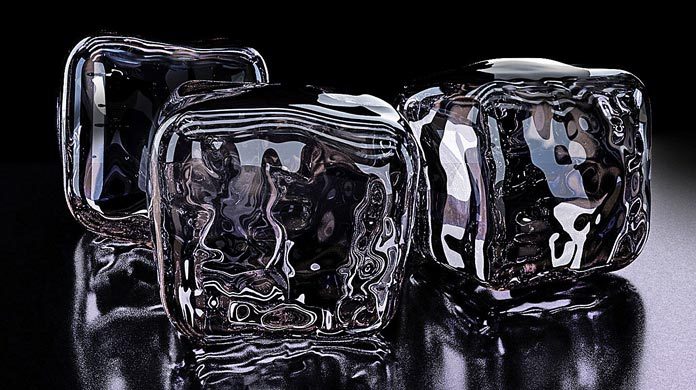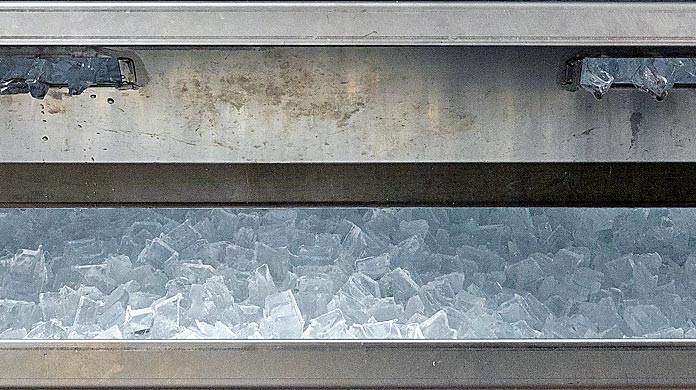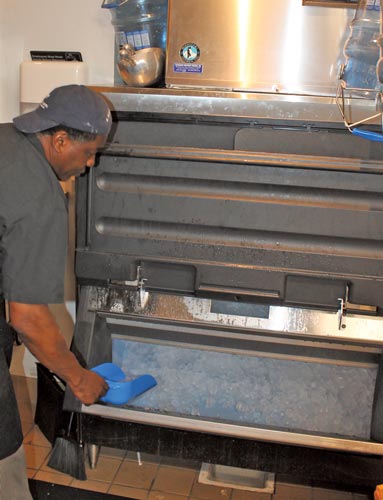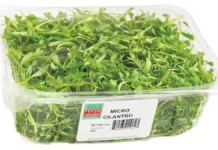
Article contributed by Easy Ice
Ice is defined as a food by the FDA, which is why health inspectors focus their attention on ice machines. Ice machines aren’t a “set it and forget it” appliance, they require preventive maintenance at least twice a year and daily routine cleaning to keep up with ice machine health codes.
A commercial ice machine installed in a bar or restaurant gets as much – if not more – use as any appliance in an establishment. Servers need ice for drinks, barbacks pull ice for the bar, and cooks use ice for food prep. With so many people having access to the ice machine, it’s vital that everyone help to keep the ice machine clean. Want to keep your ice machines free from health code violations? Here are three simple, everyday best practices staff can perform: proper ice handling, making sure the ice scoop is sanitary, and keeping the ice bin free of mold.
Proper Ice Handling

The first and easiest rule to follow is always to make sure employees are pulling ice with a scoop. Under no circumstances should anyone ever grab ice with their hands – even when wearing gloves.
Scooping ice with the customer’s glass may seem like a relatively harmless action because they’re going to drink out of the glass anyway, but this presents a danger to customers. Glasses can chip if plunged into a mound of ice with enough force. Broken glass is virtually invisible against a canvas of ice and very hard to identify if a shard happens to get dispensed in a drink. If a health inspector sees it happen, it will result in a violation.
Many establishments use 5-gallon buckets to transport ice to other areas like wait stations and under-bar bins. Make sure to label containers “Ice Only” so staff won’t accidentally fill empty food storage containers with ice.
Another rule to follow is to remember that ice bins are for ice only. Chilling bottles and cans in the bin can transmit contaminants from hands into the ice supply. Chill bottles and cans in a separate bucket. The same applies to glassware. Chill pints in a refrigerator, not the ice bin.
Finally, staff should never keep food inside of the ice bin. Food can also transmit contaminants to the ice supply and make customers sick. Just because it’s in a plastic bag, doesn’t mean it’s safe to store in an ice bin.

Take Care of Ice Scoops
Ice machine manufacturers often include an ice scoop with their machines. They’re made of plastic or aluminum and sometimes treated with an antimicrobial agent that helps eliminate contamination – but that doesn’t mean they’re impervious to microbial growth.
Since staff should only be dispensing ice with a scoop, they’re likely to get a lot of use. By adhering to some best practices, staff can prevent any unintentional contamination.
First, never store an ice scoop in the ice bin. The scoop itself should be clean, but the handle is not. Always store scoops outside of the unit, in a clean, protected receptacle or a harness if possible.
Next, ice scoops need to be sanitized just like ice bins do. Sanitize ice scoops daily with either bleach or a quat-based sanitizer. Staff can also clean the ice scoop in a dishwasher at the end of the day.
Finally, if a plastic ice scoop cracks or chips in any way, discard it and purchase a new one. Damaged scoops tend to break more easily and can leave plastic shards in an ice bin and possibly in a customer’s drink.
Clean the Ice Bin Regularly
Ice bins provide the perfect environment for mold and slime to flourish. Bins are dark, damp, and difficult to clean. Mold and slime feed off the yeast and dust in the air, so workplaces like bakeries and breweries are particularly affected by rapid mold growth.
Mold and slime aren’t generally dangerous, although they can pose problems for people with auto-immune deficiencies. Problems occur if a customer or health inspector finds mold growth either in a drink or an ice bin. Customers will most likely leave a bad review, and a health inspector will write up a business if there is enough growth in the bin.
The best way to prevent mold and slime from growing is to make sure to stick to a regular preventive maintenance schedule. A technician will make sure the ice machine is working correctly and deep clean condensers, evaporator plates, and ice bins. Technicians will also be able to estimate how much mold growth a work environment will produce and how fast it will grow. Businesses should stick to two preventive maintenance visits a year at a minimum (more if a technician discovers rapid growth stemming from the environment).
Staff should also stick to regular, light cleaning of the ice bin if they discover mold growth. To clean mold from an ice bin, spray the contaminated area with a solution of 20% chlorine and 80% water. Wipe the growth from the bin and spray the area one more time before allowing the solution to air dry.
There’s no reason an establishment should get health code violations because they neglected their ice machine. It takes the whole staff to make sure a business’s ice supply stays clean and sanitary. By following the correct procedures, performing light cleaning every day, and getting preventive maintenance at least twice a year, businesses can avoid ice machine health code violations.
























